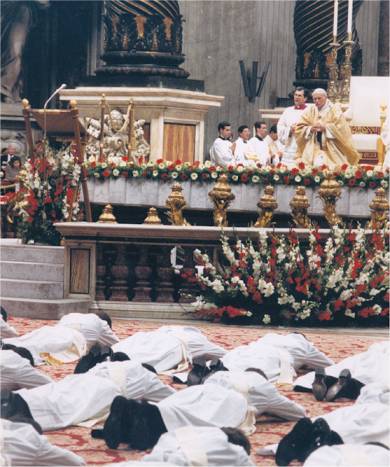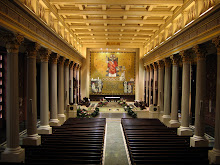As I begin, I would like to offer a word of thanks and gratitude to Fr. Juarez, pastor here of Old St. Mary’s, for both hosting this monthly Mass and for allowing me to assist over the last few months and to ‘step to the center’ here tonight. On behalf of many, thank you for making such a beautiful Church available for this liturgy.
Also, the MC for tonight’s Mass has been invaluable in preparing me for this occasion. Mr. Paver, thank you for taking the time to walk me through this process, to provide constructive feedback and encouragement; I greatly appreciate it. As I mentioned to you after the Mass of the Lord’s Supper during Holy Week: this has been a process that has helped to transform my own understanding of the priesthood and the Mass, and I am eternally grateful.
As I have been preparing for this occasion, I have had, on occasion, a number of questions as to why I, or so many of my brother priests (and seminarians) are desirous of celebrating Mass according to this Rite, or Form. I wanted to take this opportunity to provide a sort of ‘Apologia’ or defense of striving to do this, for as I just mentioned, this has been a transformative process for me, and I wish for others to understand.
What initially attracted me to this Form of the Mass, which I first attended while in College Seminary at the Josephinum, was the ‘otherworldliness’ of the approach to the Mass. To enter into these mysteries is to truly step out of time. Our physical senses are prevented from fully grasping what is happening so that our spiritual sense might become in tune with the mystery we celebrate: Latin forces the brain to relax and take it in, rather than mindlessly follow a text; the hiddenness of the priest celebrating towards the altar, instead of against the people, stresses that we cannot ‘see’ what is happening, but can only experience; the silence and stillness of so much of what happens might cause a bit of a reaction when we are so used to being engaged in everything that we do, this is somehow different, this is timeless, this is not ‘entertainment,’ this is ‘worship.’ When we confuse those two concepts, we have failed dramatically.
As a priest, there is even more to it than these. In the current translation of the Ordinary Form of the Mass, the language that is used is sometimes, umm…., presumptive. Even after only seven years as a priest, there is an idea that I say those words and it happens. As a priest, I am not proud to admit, but it can at times be easy to shut the mind off, and just go through the motions.
When one celebrates this Mass, these two traps: presumption and mindless recitation, are simply not possible. When I finish celebrating this Mass, even when said privately, I know something has been done. It takes focus, precision, and dedication to celebrate this Mass well and competently. When I hear that it was usually said in 12 minutes, rushed through and no homily and very detached from the life of the people, I simply respond: it didn’t have to be. And, honestly, is the newer form often said much differently?
More importantly, however, is the lack of presumption on the part of the priest. As I continue to learn the private prayers of the priest of this Mass, I continue to be struck by the, umm…, supplication that is included there-in. We plead and beg that this Sacrifice which is being offered might be found acceptable to God the Almighty Father, aspects which are sorely lacking in the current Ordinary Form, but will gladly be restored with the implementation of the new translation this coming Advent.
There is one prayer which I would like to highlight in how it exemplifies this difference, the ‘Placeat tibi’ which said following the dismissal and just prior to the Blessing. In English, it is rendered:
May the homage of my bounden duty be pleasing to You, O Holy Trinity; and grant that the sacrifice which I, though unworthy, have offered in the sight of Your majesty, may be acceptable to You, and through Your mercy be a propitiation for me and for all those for whom I have offered it. Through Christ our Lord. Amen.
As I read and pray this prayer at the end of the Mass, what strives to the fore is the humility required. The humility required to celebrate this Mass, that it is not about me as a priest, but about worshiping God. The humility that is required to assist at this Mass, that I am not here to be entertained, but to be united to Christ, and Him Crucified. The humility that is required for us all to approach our Lord and God in fear and trembling.
As we approach the implementation of the new translation of the Ordinary From, may the celebration of the Extraordinary Form lead us to a deeper appreciation of the mysteries we celebrate, help us all to approach our Lord in a spirit of humility and prayer, and finally strengthen us all to become more like Christ in this world so that we might be with Him forever in the world to come.










5 comments:
Congratulations, Father....from a few reader, courtesy of Fr. Z. Oremus Pro Invicem
Father, as an adult convert who was not only born post-V2 but has experienced nothing but very liberal California novus ordo, I traveled recently to attend my first ever Latin Mass. I was nervous since I had, of course, the concept stuck into my head that I, the pew-sitter, would need to do and say my part constantly, whatever that was. What a wonderful relief when I quickly realized that the priest, facing away from me like the competent pilot of an airliner, was interceding for me. It felt so very Old Testament. I mean that as a compliment to the ancient world. I accept that the laity should be educated and we are all members of the common priesthood (how constantly we strut about that!), but it was so nice to know that the priest was large and in charge according to his ordination, and not merely the "presider" aka the m.c.. I hope you know that we are grateful to you and support you 100%. May God bless you.
Brad: EXACTLY!!! you describe it perfectly.
Fr. Kyle: Thank you so much for your gift of self to God's people.
Gabe's mom.
Thank you Fr. Kyle. May God continue to bless you
Gracias, gracias, muchas gracias por sus reflexiones. Dios le bendiga. Gabriel (Argentina)
Post a Comment